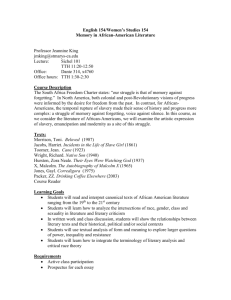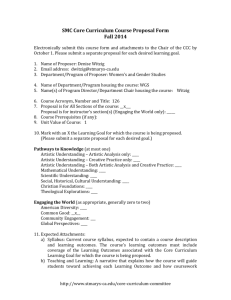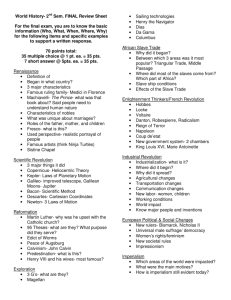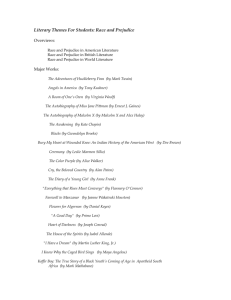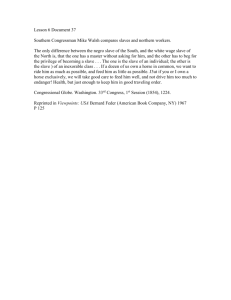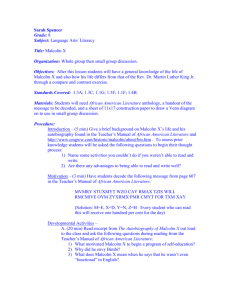TTH 11:20-12:50 - Saint Mary's College of California
advertisement
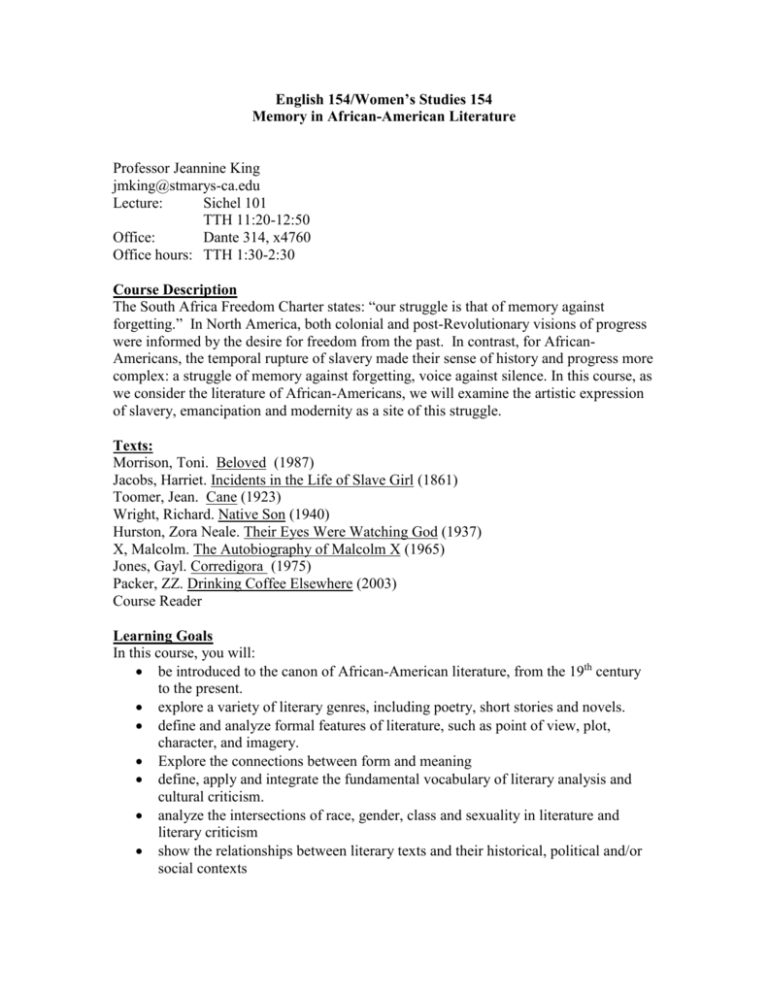
English 154/Women’s Studies 154 Memory in African-American Literature Professor Jeannine King jmking@stmarys-ca.edu Lecture: Sichel 101 TTH 11:20-12:50 Office: Dante 314, x4760 Office hours: TTH 1:30-2:30 Course Description The South Africa Freedom Charter states: “our struggle is that of memory against forgetting.” In North America, both colonial and post-Revolutionary visions of progress were informed by the desire for freedom from the past. In contrast, for AfricanAmericans, the temporal rupture of slavery made their sense of history and progress more complex: a struggle of memory against forgetting, voice against silence. In this course, as we consider the literature of African-Americans, we will examine the artistic expression of slavery, emancipation and modernity as a site of this struggle. Texts: Morrison, Toni. Beloved (1987) Jacobs, Harriet. Incidents in the Life of Slave Girl (1861) Toomer, Jean. Cane (1923) Wright, Richard. Native Son (1940) Hurston, Zora Neale. Their Eyes Were Watching God (1937) X, Malcolm. The Autobiography of Malcolm X (1965) Jones, Gayl. Corredigora (1975) Packer, ZZ. Drinking Coffee Elsewhere (2003) Course Reader Learning Goals In this course, you will: be introduced to the canon of African-American literature, from the 19th century to the present. explore a variety of literary genres, including poetry, short stories and novels. define and analyze formal features of literature, such as point of view, plot, character, and imagery. Explore the connections between form and meaning define, apply and integrate the fundamental vocabulary of literary analysis and cultural criticism. analyze the intersections of race, gender, class and sexuality in literature and literary criticism show the relationships between literary texts and their historical, political and/or social contexts 2 Requirements Active class participation prospectus for each paper short paper research paper eight one- page “talking” papers group-led discussion critical film-viewing Grading Research paper (includes prospectus): 40% Short paper (includes prospectus): 30% Participation (includes group-led discussion): 20% Talking papers and short responses: 10% Course policies All assignments must by typed and double-spaced on 8-1/2" x 11" paper. Please include page numbers. For full credit, submit all work (first draft, peer editors’ comments) with the final draft stapled on top. Attendance: If you are absent more than 3 times, your participation grade will be lowered. I will count five late arrivals as one absence. Late paper policy: All papers must be turned in at the beginning of class. If you are late, so is the assignment. The late penalty is 1/3 of a grade off (e.g. from B to B-) for every day late. Since this is an intensive course, it is strongly recommended that you keep up with the work. Plagiarism on one assignment will result in an F for the entire course. Academic Honor Code: Saint Mary’s College expects every member of its community to abide by the Academic Honor Code. According to the Code, “Academic dishonesty is a serious violation of College policy because, among other things, it undermines the bonds of trust and honesty between members of the community.” Violations of the Code include but are not limited to acts of plagiarism. For more information, please consult the Student Handbook at http://www.stmarys-ca.edu/your-safety-resources/student-handbook [for traditional undergraduate students] or http://www.stmarys-ca.edu/graduateprofessional/graduate-and-professional-student-handbook [for graduate and professional students]. Student Disability Services: Student Disability Services extends reasonable and appropriate accommodations that take into account the context of the course and its essential elements for individuals with qualifying disabilities. Students with disabilities are encouraged to contact the Student Disability Services Office at (925) 631-4358 to set up a confidential appointment to discuss accommodation guidelines and available services. Additional information regarding the services available may be found at the following address on the Saint Mary’s website: http://www.stmarys-ca.edu/sds 3 Library Assistance: Reference/Information assistance is available at the Reference Desk, by phone (925) 631-4624, text message or IM. Check the Library’s “Ask Us” link for details: http://library.stmarys-ca.edu/ask-us/ Extended assistance by appointment is also available. Contact the subject librarian for your major or any of the Reference librarians for an appointment. Or, if you'd prefer, you can provide the contact link information for your Subject Librarian, which can be found at this link: http://library.stmarys-ca.edu/about/staff/selectors.html. COURSE SCHEDULE Neo-slave Narratives I’ll not ask for the impossible; one learns to walk by walking. In time I’ll forget this empty brimming, I may laugh again at a bird, perhaps, chucking the nest— but it will not be happiness, for I have known that from “Demeter Mourning” in Mother Love: poems, Rita Dove (1995) Voyage through death/ voyage whose chartings are unlove. from “Middle Passage” in A Ballad of Remembrance, Robert Hayden (1962) T.8.29 Introduction to the course TH.8.31 Morrison, Toni. Beloved (to 133) Discussion Question T.9.5 Beloved (134-end) Talking Paper TH.9.7 Beloved “Slavery and Social Death” Orlando Patterson Steven Biko, “On Death” Group Presentation T.9.12 Beloved Documentary 4 Slave Narratives i am outside of history. i wish i had some peanuts, it looks hungry there in its cage i am inside of history, its hungrier than i thot “Dualism” in Every Goodbye Ain’t Gone, Ishmael Reed (1970) TH.9.14 Jacobs, Harriet. Incidents in the Life of Slave Girl Discussion Question T.9.19 Incidents in the Life of Slave Girl Hazel Carby, “Slave and Mistress” from Reconstructing Womanhood Talking Paper TH.9.21 Incidents in the Life of Slave Girl Group Presentation Migration: Between past and present Money burns the pocket, pocket hurts, Bootleggers in silken shirts, Ballooned, zooming Cadillacs, Whizzing, whizzing down the street-car tracks from “Seventh Street,” in Cane Jean Toomer (1923) T.9.26 Toomer, Jean. Cane Discussion Question TH.9.28 Cane Talking Paper Griffin, Farah Jasmine, excerpt from Who Set you Flowin’? T.10.3 Cane 5 Group Presentation Prospectus #1 due Masculinity I am eager to burn this threadbare masculinity this perpetual black suit I have outgrown. from “Heavy Breathing,” in Ceremonies: Prose and Poetry, Essex Hemphill (1992) T.10.10 Wright, Richard. Native Son Talking Paper TH.10.12 Native Son Peer-editing Paper #1 T.10.17 Native Son Ellis Cose. “A Group Apart” in The Envy of the World Group Presentation Memory, Gender and the Quest We shall not always plant while others reap The golden increment of bursting fruit, Not always countenance, abject and mute, That lesser men should hold their brothers cheap; Not everlastingly while others sleep Shall we beguile their limbs with mellow flute, Not always bend to some more subtle brute; We were not made eternally to weep. from “From the Dark Tower,” in Copper Sun, Countee Cullen (1927) TH.10.19 Hurston, Zora Neale. Their Eyes Were Watching God Discussion Question Final Draft Due: Paper #1 T.10.24 Their Eyes Were Watching God Group Presentation 6 TH.10.26 Their Eyes Were Watching God Film Memory and Political Movement Calling black people Calling all black people, man woman child Wherever you are, calling you, urgent, come in Black people, come in, wherever you are, urgent, calling you, calling all black people calling all black people, come in, black people, come on in. from “SOS,” in Black Magic, Amiri Baraka (1969) T.10.31 X, Malcolm. The Autobiography of Malcolm X Discussion Question TH.11.2 Autobiography of Malcolm X Poetry of the Black Arts Movement Talking Paper T.11.7 Autobiography of Malcolm X Group Presentation Memory and the Body I am a black woman the music of my song some sweet arpeggio of tears is written in a minor key and I can be heard humming in the night Can be heard Humming in the night. from “I Am a Black Woman,” in I Am A Black Woman, Mari Evans (1970) TH.11.9 Jones, Gayl. Corregidora Discussion Question T.11.14 Corregidora 7 Angela Davis, “I Used to Be Your Sweet Mama”: Ideology, Sexuality and Domesticity” Talking Paper TH.11.16 Corredigora Group Presentation Memory, Love and Forgiveness It is the thickest blood on this planet The feet that slip That slide in spilled lakes of black blood On back roads marked with rusted dead-end signs They don’t fit into any shoes Not Nikes Not Reeboks from Blood, Sarah Jones T.11.21 Packer, ZZ. Drinking Coffee Elsewhere Talking Paper TH.11.23 THANKSGIVING HOLIDAY T.11.28 Drinking Coffee Elsewhere Group Presentation TH.11.30 Drinking Coffee Elsewhere Peer-editing: Paper #2
